5 Popular Personality Tests and Their Use in Pre-Employment Assessment
We are a certified Continuing Education provider for
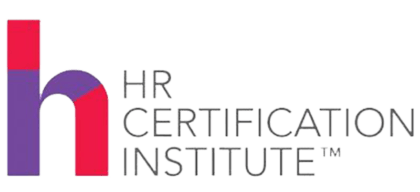
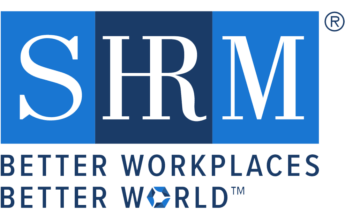
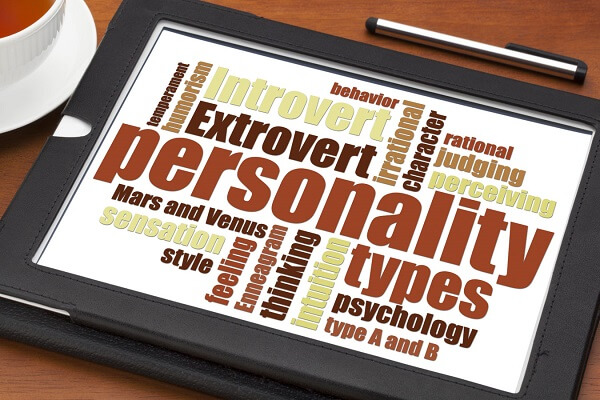
“What a charming personality he has! He must rock that customer service job!” “Her strong, result-oriented personality recommends her for a management position!” How many times did we say/hear this in our current practice? How many Fortune 500 companies asked recruiters to apply popular personality tests when assessing job candidates?
Psychometric testing is not a new idea in the recruitment process. On the contrary, psychology and diagnosis evolved so much that they give us access to a wide range of valid personality tests to use in recruiting. You can always try a BuzzFeed-style personality assessment. After all, we all want to know what Disney princesses we are. Nevertheless, today, we will talk about a handful of popular personality tests for recruitment.
5 Popular Personality Tests for Pre-Employment Assessments
You have to understand that personality tests vary in purpose, thus generating different science-based types of personality tests. Historically, most of them began as formal inventories used in clinical environments to assess personality disorders, the potential for antisocial behavior, neurotic personality traits, temperament, etc.
On the other hand, you do have a ton of informal personality tests helping people learn what type of spring flowers they are. It is all fun and games, of course.
Eventually, we have formal and standardized tests to assess personality for business and employment environments. We are going to talk more about personality tests for jobs.
1. The Big 5 Personality Test
We have talked about the Big 5 Personality Test and its numerous positive correlations with soft skills, integrity, even multitasking abilities, and more. Overall, the Big 5 is one of the most popular personality inventories used in pre-employment assessments today.
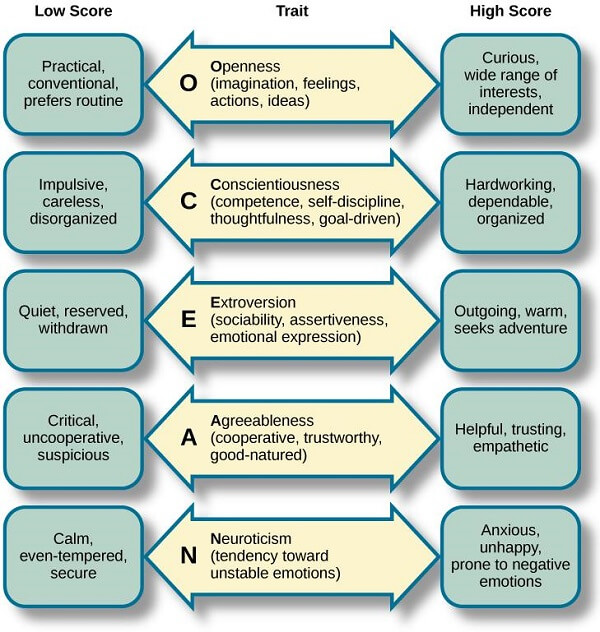
According to meta-analyses and recent data, at least two of the BIG 5 personality test dimensions correlate with job performance, so here is the reason why most companies and HR businesses use this inventory for pre-employment assessments.
The test prompts the candidates to answer a series of questions/situations and report how much each statement is true for them on a scale from one to five:
- A score of 1 means that the candidate disagrees with the idea (it is false for them),
- 3 equals a neutral stance,
- 5 represents the candidate’s complete agreement with the statement (it is valid for them).
You may have read about the Big 5 Personality Test as the OCEAN inventory. If you find it for sale under this name, know it is the same tool.
What Does the Big 5 Personality Test Measure?
Here are the five personality factors measured by the Big Five Personality Test. You will find these factors present in other types of personality tests too.
- Openness – towards new people and challenges, learning of new things, engaging in new experiences;
- Conscientiousness – a dimension that correlates positively with job performance, intelligence, integrity, and many other soft employability skills. In the Big 5 paradigm, this dimension describes an individual’s propensity towards self-organization, preparedness, attention to detail, and more.
- Extraversion is a dimension showing an individual’s ability to engage in relevant social interactions, meet new people, talk to others, etc.
- Agreeableness – allows recruiters to learn if their future employees seek social harmony or, on the contrary, are conflictual and seek confrontations;
- Neuroticism – this dimension gives insight into individuals’ inclination towards anxiety, depression, stress levels, etc.
As we have said many times before, you should always use the Big 5 personality test results in conjunction with other types of personality, cognitive, and behavioral assessments, as one single test cannot land you the perfect candidate.
2. The Revised NEO Personality Inventory
The Revised NEO Personality Inventory (NEO-PI-R) is an extended and upgraded version of the BIG 5 Personality Test. It measures the same five factors: openness to experience, extraversion, agreeableness, conscientiousness, and neuroticism. The difference between the NEO and the classic Big 5 inventory is that the revised version adds six traits/personality aspects relevant to each of the main five personality factors.
In other words, with the NEO-PI-R, you can assess a candidate on 30 well-defined facets.
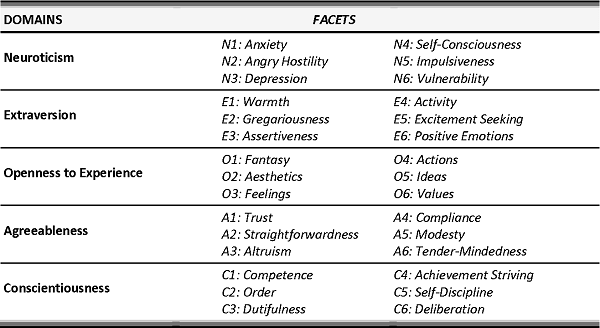
The test is valid for clinical environments to assess adults presenting various psychopathologies, but it also works well with children assessments and business environments.
If you use the complete NEO-PI-R inventory, you should know it consists of 240 items, whereas the shorter version has only 60 items (12 per each personality domain).
The NEO-PI-R is an efficient tool in the pre-employment assessment stage of the hiring process. If you want to learn more about a candidate’s conscientiousness – one of the Big Five’s personality factors that is also the most powerful job performance predictor – you can go deeper with your research. Use the Revised NEO Personality Inventory to get a better understanding of how the applicant reflects conscientiousness:
- Self-efficacy;
- Organization;
- Sense of duty;
- Striving for achievements;
- Self-discipline;
- Deliberation.
Do the same if an introvert-extrovert test did not offer you what you wanted to learn. In the NEO-PI-R model, extraversion means assertiveness, activity, warmth, sociability, excitement seeking, and positive emotions. These are most likely traits you want to hire for when it comes to certain positions or organizational core values.
3. The DiSC Personality Test
The first thing you should know about the DISC Personality Inventory is that it is not a personality test per se but more a tool to assess temperament. You can score it, of course, but it is hard to use its results to compare between two candidates. Among psychologists and recruiters, there is still debate whether the DISC is a valid job performance predictor.
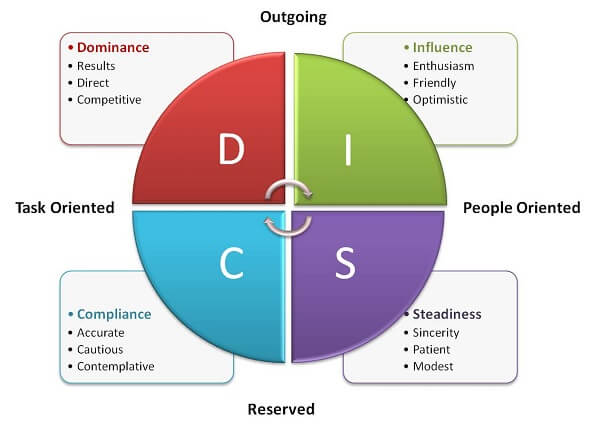
However, since it highlights the individual strengths, you can use it to gain better insight into an applicant’s fortes during the hiring process. It measures four dimensions, as follows:
- Dominant – it reveals a candidate’s inclinations towards being result-oriented, blunt, confident, direct, challenge-seeking, leading, etc.;
- Influential – in this category, you will most likely find candidates who display enthusiasm and optimism, are collaborative and communicative, open, and spotlight-oriented;
- Steady – such traits include calmness, dependability, loyalty, openness to cooperation, honesty, and more.
- Compliant – this dimension describes individuals who are objective, independent, accurate, competent, detail-oriented, and praising quality over quantity;
This test is shorter and user-friendlier than the Big 5 and other personality tests. It also comes in various forms, with questions ranging from 12 to 30. You present the candidate with a list of words (usually adjectives). The applicants have to choose the phrases they feel apply to them the most and the least.
As long as you do not justify hiring decisions based on the DISC personality test, you can use it to gain better insight into candidates’ minds. Having their answers can help you build a behavioral interview, for instance, addressing specific individual DISC dimensions relevant for the position you offer.
4. The Caliper Profile
Research shows that the Caliper Profile has high predictive accuracy rates when it comes to matching a candidate’s personality with a particular job profile. The test consists of various types of questions and addresses personality traits, cognitive skills, and behavioral tendencies.
This personality test consists of 180 multiple-choice questions/statements. The candidate has to decide which of the statements fits best (or least) their viewpoints. Since it is a very complex pre-employment assessment tool, the Caliper Profile also offers candidates true-or-false questions or “degree of agreement” scales.
Taking about two hours to complete, the Caliper Profile is a valid hiring tool giving companies a fuller picture of candidates’ inner strengths, abilities, behavioral tendencies, and more.
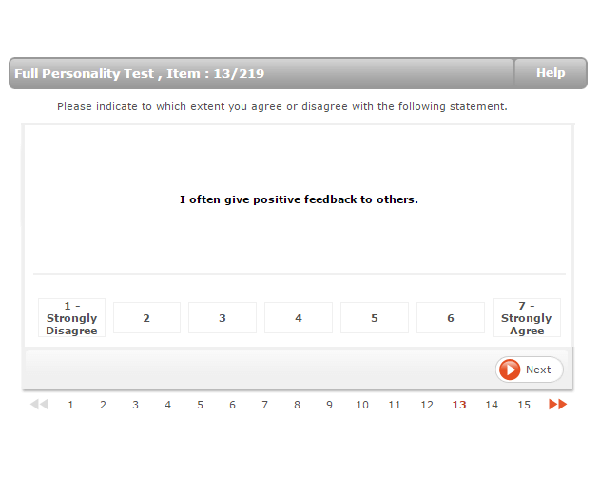
The best part of the Caliper test is that you can customize it to get data on job-fit matches or candidates’ potential performance in a specific position.
5. The Hogan Personality Inventory
Developed in the eighties as a socio-analytic tool, the HPI is now one of the most popular personality tests used in pre-employment as a performance predictor. The authors validated it against two hundred occupations, normalizing it for about half a million individuals worldwide. In other words, some companies and recruiters use it to weigh an individual’s temperament and how it matches a given job role’s demands.
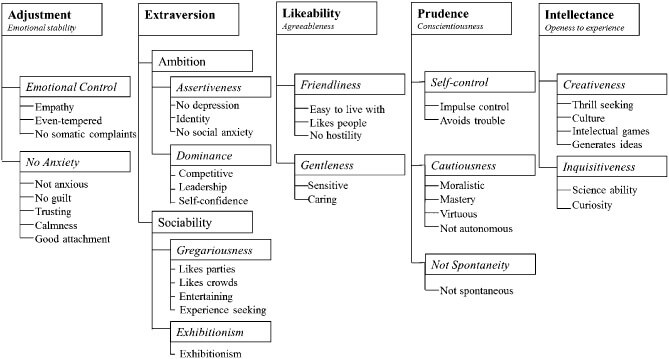
This personality test finds its inspiration in the Big 5 personality inventory. Its advantage in organizational psychology is that it measures standard and “bright-side” individual traits while predicting job success. The candidate receives a questionnaire containing 206 true/false statements/questions. The test comprises 42 subscales (6 occupational scales and seven primary scales). Here are the six occupational scales of this test:
- Service orientation;
- Stress tolerance;
- Reliability;
- Clerical potential;
- Sales potential;
- Managerial potential.
As you can quickly find out, you can assess a candidate’s job performance potential with the help of this personality test. However, up your ante and use it in conjunction with cognitive and aptitude tests! You can measure separately sales potential & abilities, clerical skills, management skills, and more. As always, more tests will give you a better understanding of a candidate’s profile and potential than just one.
Why Do We Use Personality Tests in Recruiting?

We saw the most popular personality tests used during the pre-employment process. Now it is time to understand better why the world is adamant about revising them. Organizational and clinical psychologists develop new ones, debunk old ones, perfect tools that measure more than temperament or “traits.” We also assess cognitive skills, emotional intelligence, aptitudes, and more.
Employers and HR specialists learned that a mismatch between an individual’s personality and the job role/organizational culture can lead to low employee engagement and high turnover rates. Replacing employees is more expensive than acquiring personality tests and pre-employment assessments. Recent statistics show that almost 70% of recruiters use personality tests and other forms of pre-employment checks to vet candidates during the hiring process.
When you look at the data, you quickly realize that companies such as Citigroup, Ford Motor, Procter & Gamble, or JPMorgan are on to something. They all use pre-employment psychometric testing one way or another.
But why do such big names in the business landscape use popular personality tests to evaluate candidates?
For What Reasons Are Personality Tests Used In Jobs Today?
Personality tests offer employers insight into candidates’ character traits and personal dimensions that can predict their job performance. But it is not the only reason.
- Using a personality test (or more) to assess an individual helps companies learn whether that candidate fits the organizational core values;
- Such tests allow companies to understand better the person’s working style and potential for growth;
- Standardized personality tests help recruiters compare and differentiate candidates; it helps them handpick only the best ones for the following recruiting stages;
- Sometimes, companies re-evaluate candidates using personality tests to assess their employees’ current inner strengths; they do so to nurture them and manage them better;
- Ultimately, personality testing (before and after hiring candidates) serves as a tool to assess employability skills. Such abilities prevent turnover and engagement downfalls. It helps companies find talent to promote within the company’s ranks and breed a new generation of leaders.
Pre-employment personality testing is a two-billion dollars industry steadily growing as each day goes by. Are all the popular personality tests the same? Do they present unquestionable validity? Should you use them during the hiring process while trusting their results 100%?
Just as we discussed when we approached introvert-extrovert testing, even some of the most popular personality tests come with limitations. It does not mean you should not use them. On the contrary, you should use them, but together with other types of tests. We refer to standardized cognitive & aptitude assessment tools, behavioral inventories, structured and unstructured interviews, integrity tests, and more.
How to Choose Among the Popular Personality Tests on the Market?
When you look for pre-assessment tools, you will rarely find independent inventories and tests. Sure, you could buy one for the HR department, but you need much more than flour to bake a cake. In other words, professional pre-assessment tools providers usually offer extended testing batteries. For instance, our kit of personality tests for hiring includes:
- The Big 5 Personality Test;
- An integrity test;
- A short personality inventory;
- A Predictor Profile.
In conclusion, you need more than one test to understand a candidate and accurately predict job performance. Mix the Big 5 with the NEO-PI-R and the HPI. On the other hand, use them and the Caliper profile with a cognitive testing kit and other assessment tools. Always focus on fluid intelligence, soft skills, hard skills, and so on. Never forget about the interviews!
Final Thoughts
Do you use one or more of these popular personality tests when you assess new candidates? Does your organization use personality tests to leverage existing employees’ strengths and potential? What are your thoughts on personality testing during the recruiting process? What other personality inventories do you find the most efficient?
We would love it if you shared your thoughts and experiences with us!
Book An Appointment
Schedule a Free Consultation to Turn your Hiring Process into a Top Talent Generating Machine
Talk With Us Now
Identify Top Candidates ASAP
(833) 332-8378
